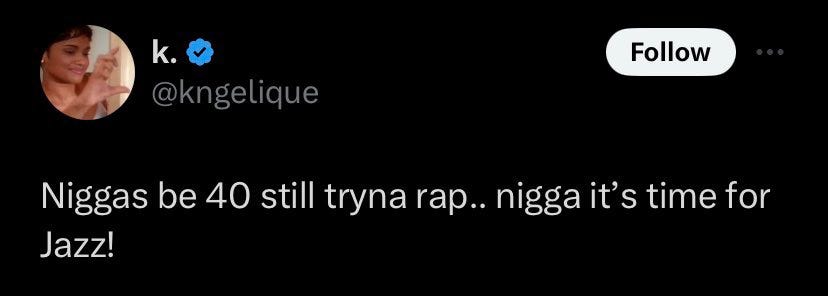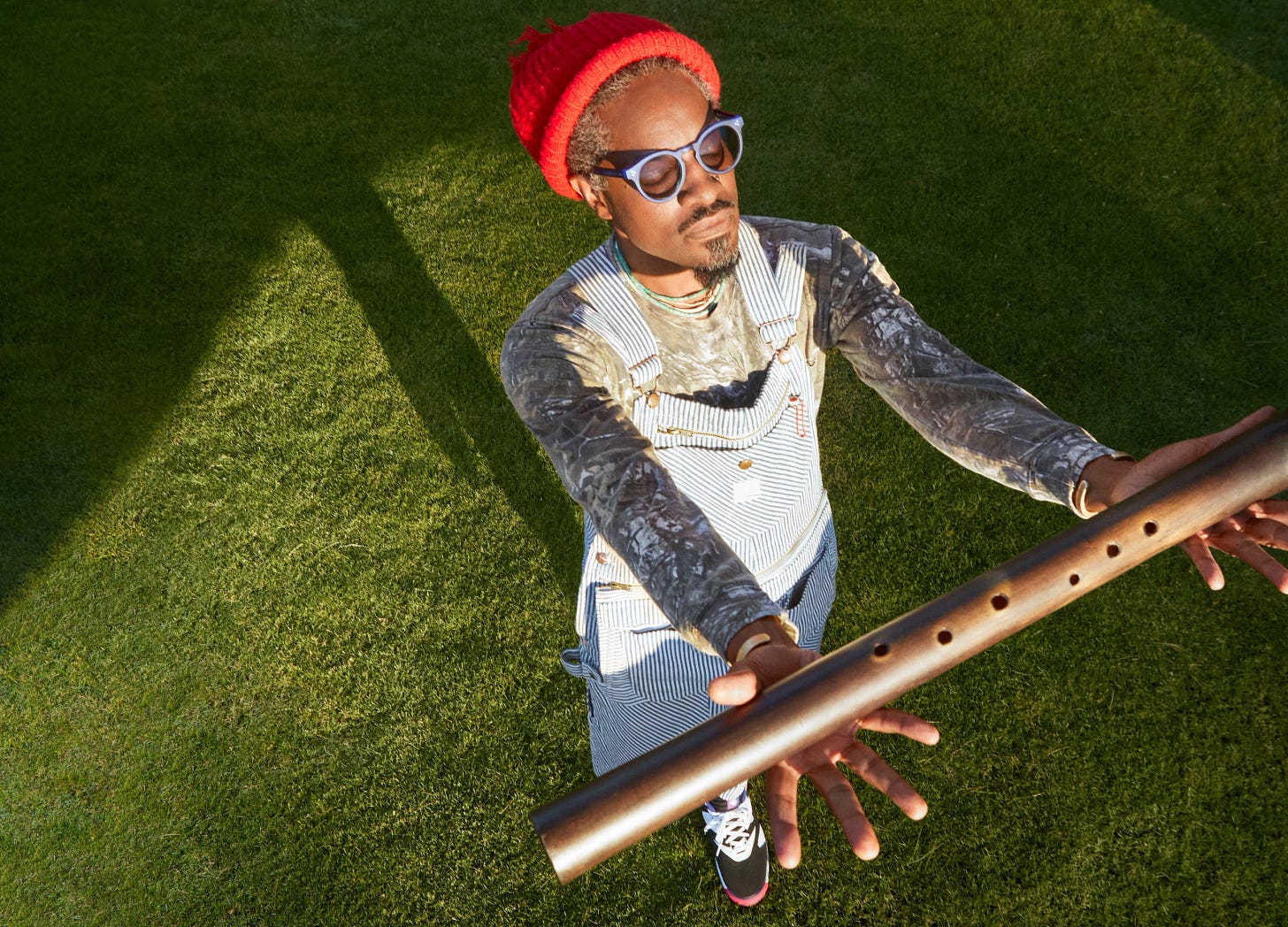Winds of Change
Andre 3000's New Blue Sun and the art of subverting expectations
André 3000 has been a north star for me artistically ever since I was a teenager. OutKast showed me how far rap could really go, that there was another path possible. His music radicalized me. I used to play his verses for my teachers in high school to show them what I wanted to be when I grew up.
André is the archetypical reclusive artist whose last full-length release came out seventeen years ago. His recent statements to the world have been in dribs and drabs: a procession of explosive guest verses for other artists, various forays into acting, an OutKast festival tour in 2014 highlighted by his donning of jumpsuits with provocative statements.
So when I learned that Andre would be putting out a new album this week, I was obviously very excited. But check out the fine print on the packaging:
Apparently, this new album would be made up exclusively of flute music. This makes those sightings of him tooting around on a woodwind instrument from a few years ago now seem like the longest unintentional album rollout ever. Learning the truth about the record made me feel a tinge of anger. Why wasn’t he rapping when he’s one of the best to ever do it? Was he trolling? Why must he withhold his gift?
This isn’t just some guy deciding not to rap anymore. André is your favourite rapper’s favourite rapper. On top of being a devastatingly agile vocalist, he’s also an uncommonly introspective and vulnerable lyricist, singularly capable of mining emotional depths that are inaccessible to pretty much everyone else. He’s a walking endorsement of the potential for art and commerce when they’re perched in harmonious balance, an underground rapper in spirit who has sold 20 million records and won seven Grammys without ever compromising. There’s only one André 3000.
Listening to André’s NPR interview about the album, he sounds remarkably at peace and clear-eyed about his new musical direction. The album is an improvisational jazz record that finds him probing along the edges of a new horizon. It’s about the journey, not the destination. New Blue Sun forces us to reconsider how we perceive the output of our favourite musicians and how to react when it’s not what we’ve come to expect from them.
In his interview with GQ’s Zach Baron, André briefly lit the internet on fire by saying “I’m 48 years old. And not to say that age is a thing that dictates what you rap about, but in a way it does. And things that happen in my life, like, what are you talking about? ‘I got to go get a colonoscopy.’ What are you rapping about? ‘My eyesight is going bad.’” People took this to mean that older folks don’t have anything to rap about when he was merely detailing his own personal response to the uniquely intense cosmic weight around his own reluctance to rap at this point in his life.
We typically associate an André 3000 record with verbal prowess. Here we’re presented with electronic flute flourishes, pillowy synth pads and ambient jazz textures that wouldn’t be out of place on an ECM Records release. Upon listening to New Blue Sun, my consternation swiftly dissipated. Less Renaissance faire, it’s more in the vein of Laraaji’s ambient spiritual explorations or Jon Hassell’s Fourth World records with Brian Eno. “BuyPoloDisorder’s Daughter Wears A 3000® Shirt Embroidered” in particular is sumptuous and lovely, like library music crossed with the theme from Hinterland Who’s Who.
The music is helmed by a cadre of heavy Los Angeles jazz musicians, making it the perfect soundtrack for “Club Erewhon,” 3000’s nickname for the hip California grocery store chain where he first met collaborator Carlos Niño. Despite the new methodology and team, these compositions are clearly by someone we already know. His voice is there, even when it isn’t. We expect prints from Warhol but what happens when he makes paintings with Basquiat? Either way, it’s art, perhaps especially when it subverts our expectations.
There’s something radical and freeing about his commitment to his new direction. In the NPR interview, André admits that he’s been sometimes apprehensive about releasing music that he doesn’t feel 100% about over the years, which is the opposite of how we’re encouraged to act as musicians today. His candor is refreshing in the face of the unending bluster we’re served up with during everyone else’s album cycles. You don’t expect a legend in his field to ever publicly acknowledge any insecurity but perhaps a true master knows that they’re merely a medium for ideas to flow through.
This slow, long album that came out of nowhere after a long absence feels completely at odds with what the app companies want us to be doing: always releasing, always posting, always creating content. This urging to produce isn’t creative, it’s capitalistic and the hollowness of it all can be heard in what is made from it. Musicians who are frantically pumping out albums seem to make music that lingers in the public consciousness for a shorter time.
How many of us have to do something for work that we absolutely don’t want to do? Even if we’re skilled at it, it feels bad, this tyranny of obligation. So why should we put that same pressure onto our most beloved artists? These are the people who follow their muse, inspiring us in the process. The artist is a searcher who shows us the way. I hope André encourages us all to discover our inner flautist.
Listen to André 3000’s New Blue Sun here
You can find me updating my playlists or hanging on Twitter and Instagram. You can listen to my music on Spotify, Apple Music and Bandcamp and you can get Cadence Weapon merchandise here. Read my monthly column in Hazlitt. Pick up your copy of Bedroom Rapper here and please rate it on Goodreads.









Love this whole piece, but also: A+ headline
The tyranny of obligation 🥺